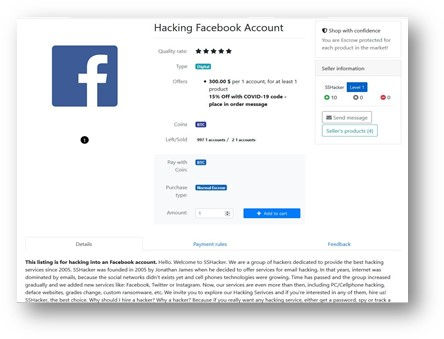With malware spreading faster through these offers and discounts, and with a staggering rise in coronavirus related domains, the threat of cyber attacks is increasing during the coronavirus pandemic.
Hackers are selling malicious malware and exploitation tools through “COVID19” discount codes on the dark net, say researchers at Check Point. In similar fashion to Black Friday or Cyber Monday discounts, hackers are using the coronavirus pandemic as a special promotion to spread malicious “goods” to hungry cyber attackers. With malware spreading faster through these offers and discounts, and with a staggering rise in coronavirus related domains, the threat of cyber attacks is increasing during the coronavirus pandemic.
Hack Facebook Accounts with a “15% off with COVID-19 code”
In the following example, Check Point found a group offering services to hack into Facebook accounts at a discount rate through a COVID-19 discount code. Dedicated to “providing the best hacking services”, the group assumes the moniker of SSHacker and has been active since 2005.

Bypass Email and Chrome Security with “Coronavirus Discount! 10% off all products”
In another example, the special offer “CoronaVirus Discount! 10% off ALL products” isn’t for fashion merchandise or a new smart watch, but for a malicious toolkit, such as “WinDefender bypass” and “Build to bypass email and Chrome security.”

Macbook via Corona Virus Special
In this last example, a seller that goes by the name of “True Mac” offers the “most-loved Mac” model – MacBook Air – for the price US$390 as a “corona special offer”. With a price like that, it’s almost always too good to be true, warranting questions around how the product is actually sourced. The product is likely stolen or fake.

Latest COVID-19 Cyber Threat Numbers
- Over 16,000 new coronavirus-related domains have been registered since early January 2020
- Majority of coronavirus-related domains were registered in the past 3 weeks. The number of domains registered in the past 3 weeks is 10x more than the average number found in previous weeks
- In the last week, more than 6,000 new domains were registered – an 85% increase compared to the week before
- 0.8% of the domains registered in the past 3 weeks were found to be malicious (93 websites)
- 19% of the domains registered in the past 3 weeks were found to be suspicious (more than 2,200 websites)
How to Avoid Coronavirus Scams
To avoid falling victim to online scams, Check Point recommends:
- Beware of unknown senders. Be cautious with emails and files received from unknown senders, especially if they are offering special deals or discounts.
- Avoid unknown attachments. Don’t open unknown attachments or click on links in the emails.
- Google your desired retailer. Ensure you are ordering goods from an authentic source. One way to do this is NOT to click on promotional links in emails, and instead, Google your desired retailer and click the link from the Google results page.




